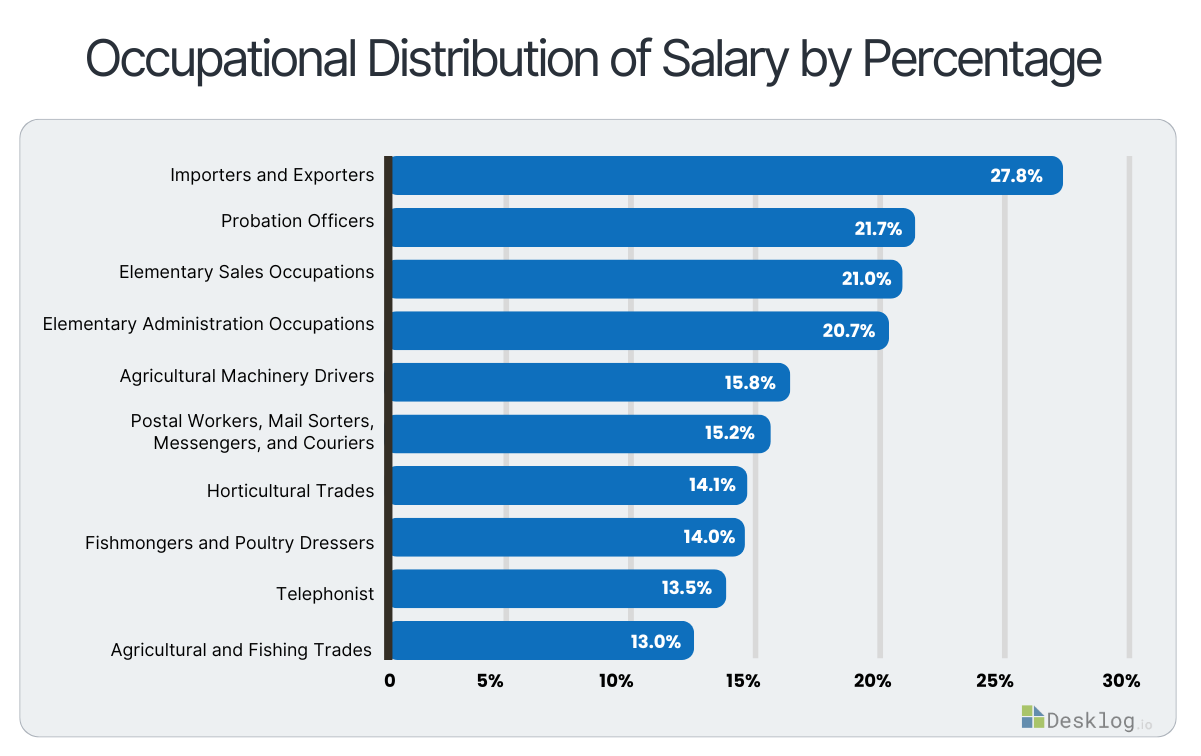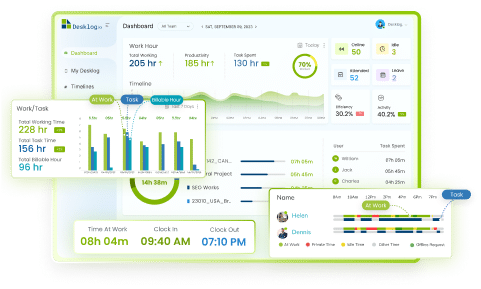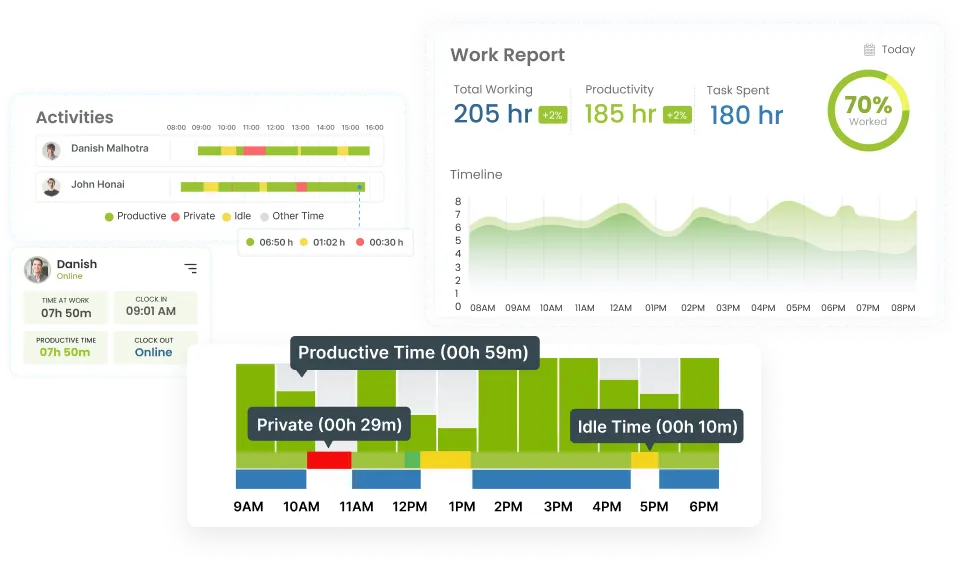Average Salary in UK ( 2024 Data )
What has happened to this world? It often feels like everyone is racing after money, with some scaling the heights of success while others plummet into despair. But we can’t blame anyone for that. In today’s economy, making money has become essential for survival, as nearly every aspect of life revolves around it. Amidst this whirlwind, many individuals aspire to seek greener pastures abroad, driven by dreams of prosperity and better opportunities.
In recent years, the UK has become an attractive destination for professionals seeking higher salaries and a new lifestyle. While the average salary in UK is appealing compared to many countries, it’s crucial to consider what the UK offers beyond financial gain. This pursuit often involves challenges and cultural adjustments that potential migrants must weigh against the benefits of relocating.
This guide aims to provide a complete look into salary expectations in the UK. By the end, you’ll have a clearer understanding of whether this journey is worth making a decision about your future.
What is the average salary in UK?
As of the latest data, the average salary in the UK per month is £1,950, totaling £29,600 annually . The gross minimum wage in the UK stands at £15.65 per hour as of 2024. The average salary in the UK varies significantly based on factors like industry, occupation, location, age, and education level.
Annual salaries in the UK vary widely, with the lowest earners making around £15,576 and the highest earning up to £58,140. This range reflects differences in job types, experience levels, and industries. For example, professionals in fields like finance or technology often see higher salaries, while those in retail or hospitality may earn on the lower end of the spectrum.
In addition to base salaries, many jobs offer additional benefits, such as housing allowances, transportation subsidies, and bonuses, which can enhance overall compensation.
The median salary is particularly telling at £29,700 per year. This figure indicates that 50% of workers earn less than this amount, while the other half earn more. It provides a snapshot of the earnings distribution in the country, highlighting economic disparities. Those earning below the median may face challenges related to cost of living, while those above it might enjoy more financial flexibility and stability. Understanding this context is crucial for analyzing the economic landscape in the UK.
Are you excited to learn about the average salary in India too? Let’s find the facts together.
What’s the median salary in the UK?
The median salary serves as the midpoint between the lowest and highest earnings, providing insight into the economic health of the country and the typical standard of living. According to data from ASHE, the median salary in the UK is £2,492 per month, which amounts to £29,900 annually.
When examining this further, full-time employees have a median salary of £2,955 per month, equating to £35,464 annually, while part-time employees earn a median of £1,044 per month, or £12,532 annually.
What is the average salary in each UK country?
Recent days have witnessed the increase in the average salaries in nearly every region. The UK is divided into four countries, each with its average salary as follows:
| Country | Average Salary (Annual) |
|---|---|
| England | £26,192 |
| Northern Ireland | £28,363 |
| Scotland | £26,139 |
| Wales | £23,996 |
The average salary in UK remains particularly high in strong areas like Scotland and Northern Ireland. The average annual salary in Northern Ireland has risen to match or even surpass that of the other regions. The average wages in England and Scotland are nearly the same.
What Is The Average Salary In The UK By Region?
In 2023, the median annual earnings for full-time employees in the UK were £34,963, with significant regional variations. The average salary in UK can be divided in general, London had the highest average earnings at £44,370, while the North East reported the lowest at £31,200. Additionally, the South East has £36,560 and Scotland has £35,518, surpassing the UK average. This disparity highlights the regional inequality within the UK, particularly between London and other areas.
Productivity in London is 33.2% higher than the UK average, and its GDP per head in 2021 was £56,431, compared to the UK average of £31,947. The South East was the only other region to exceed the national GDP average. Furthermore, inequality exists within London itself, as demonstrated by the stark difference in average weekly earnings between the historic City of London (£1,138) and Redbridge (£588), a borough in the North East of the city.
Does Location Affect Average Salary?
Where you live and work significantly impacts your take-home pay. Employers typically offer higher wages in areas with greater living costs, like London and the South East. ONS data shows that London has the highest wages for all age groups except the youngest. For workers aged 18-21, wages are higher than in London in regions such as the West Midlands, the East, the North East, and the South West. For those over 60 living outside London, the East, South East, and Scotland have the highest median weekly wages.
Weekly Wage (median) Full Time Gross Pay by Region
| Age | North East | North West | Yorks and Humberside | East Midlands | West Midlands | East | London | South East | South West | Scotland | Wales |
|---|---|---|---|---|---|---|---|---|---|---|---|
| 18-21 | £246 | £236 | £240 | £225 | £295 | £285 | £242 | £201 | £248 | £240 | £218 |
| 22-29 | £464 | £475 | £465 | £479 | £479 | £498 | £613 | £502 | £479 | £494 | £471 |
| 30-39 | £524 | £566 | £528 | £532 | £576 | £573 | £809 | £613 | £567 | £572 | £550 |
| 40-49 | £552 | £583 | £551 | £568 | £593 | £580 | £812 | £641 | £582 | £624 | £581 |
| 50-59 | £500 | £547 | £502 | £519 | £542 | £558 | £743 | £601 | £535 | £566 | £506 |
| 60+ | £401 | £400 | £379 | £431 | £408 | £448 | £549 | £448 | £395 | £439 | £417 |
Source: ONS Annual Survey for Hours and Earnings (October 2022)
Searching for top-notch time tracking software for your business?- Snap it out!
Average Salary By City
There are notable variations in median weekly earnings across different cities in the UK. This data highlights how local economies influence income levels, with certain areas offering significantly higher average pay compared to others.
The table below showcases the local authorities with the highest median weekly earnings, providing a clear picture of where the best financial opportunities may lie. Understanding these regional differences can be essential for job seekers and professionals considering relocation or looking to maximize their earning potential in specific markets.
| City/Area | Median Weekly Earnings |
|---|---|
| City of London | £1,120 |
| Tower Hamlets, London | £1,054 |
| Westminster, London | £906 |
| Inner London | £903 |
| Islington, London | £897.40 |
| Mole Valley | £878 |
| Hackney, London | £865 |
| Three Rivers, Hertfordshire | £863 |
| Shetland Islands, Scotland | £859 |
| Camden, London | £850 |
It’s time to stop counting how many working days in a month, try to count how much salary I can get!
Average Salary By Age
Understanding how average salaries vary by age can provide valuable insights into career progression and financial expectations. Typically, younger workers in their early twenties may start with lower salaries as they enter the job market, while those in their thirties and forties often see significant increases as they gain experience and expertise.
As individuals reach their fifties and sixties, salaries may plateau or even decline slightly, depending on industry trends and retirement patterns. Learning these trends can help you find your career path and set realistic financial goals at different stages of your life:
| Age Group | Median Annual Salary | Average Weekly Earnings |
|---|---|---|
| 18-21 | £22,932 | £441 |
| 22-29 | £30,316 | £583 |
| 30-39 | £37,544 | £722 |
| 40-49 | £40,040 | £770 |
| 50-59 | £37,804 | £720 |
| 60+ | £33,852 | £651 |
Salary Overview by Age Group in the UK
Ages 18-21: Median annual salary is £22,932, with average weekly earnings of £441. Young workers typically earn less due to limited experience.
Ages 22-29: Median annual salary rises to £30,316 (£583 per week). At this stage, many gain valuable experience but face financial pressures, like high living costs.
Ages 30-39: Median annual salary increases to £37,544 (£722 per week). This decade often brings greater financial responsibilities, such as family planning.
Ages 40-49: Median annual salary peaks at £40,040 (£770 per week), marking the highest earning period for many, often accompanied by lifestyle upgrades.
Ages 50-59: Median annual salary declines to £37,804 (£720 per week). Earnings typically start to drop as workers shift focus from career to personal fulfillment.
Ages 60+: Median annual salary further decreases to £33,852 (£651 per week). This decline can be attributed to more workers leaving the labor force or working part-time as they approach retirement.
Does flex time help you to achieve more productivity and thereby money? Check it out!
Salary Expectations Across Various Job Sectors in the UK
How much salary can you earn in different UK job sectors?
Finding the salary ranges across various job sectors in the UK is essential for understanding the economic landscape and making informed career decisions. Salaries can vary significantly based on factors such as industry demand, required skills, level of experience, and geographical location.
This variation highlights the diverse opportunities available within different fields, from healthcare and finance to technology and education. By examining these sectors, individuals can gain valuable insights into potential earnings and align their career aspirations with realistic financial expectations. The table below illustrates the average salary in UK at various job sectors:
Job Sectors Vs Average Salary in UK
| Job Sectors | Average Salary (per year) |
|---|---|
| Financial and insurance activities | £43,508 |
| Electricity, gas, steam, and air-conditioning supply | £43,430 |
| Information and Communication | £41,552 |
| Mining and quarrying | £37,567 |
| Professional, scientific and technical activities | £37,246 |
| Construction | £34,892 |
| Education | £33,910 |
| Public administration and defense; compulsory social security | £33,447 |
| Water supply; sewerage, waste management, and remediation activities | £32,069 |
| Transportation and storage | £31,902 |
| Manufacturing | £31,676 |
| Real estate activities | £30,171 |
| Human health and social work activities | £28,181 |
| Other service activities | £27,723 |
| Administrative and support services activities | £27,069 |
| Agriculture, forestry, and fishing | £26,363 |
| Wholesale and retail trade; repair of motor vehicles and motorcycles | £26,244 |
| Arts, entertainment, and recreation | £25,548 |
| Accommodation and food service activities | £20,015 |
Which industries have seen the most growth in UK?
Are you curious about which industries in the UK are not just grown but also offering some of the highest-paying opportunities? In a rapidly evolving job market, understanding where the growth is happening can open doors to lucrative career paths.
From the tech industry to healthcare, certain sectors are not only booming but also rewarding skilled professionals with impressive salaries. Let’s find those industries that are reshaping the average salary in UK and why they might be the perfect fit for your next career move:

| Occupation | Percentage |
|---|---|
| Importers and Exporters | 27.8% |
| Probation Officers | 21.7% |
| Elementary Sales Occupations | 21.0% |
| Elementary Administration Occupations | 20.7% |
| Agricultural Machinery Drivers | 15.8% |
| Postal Workers, Mail Sorters, Messengers, and Couriers | 15.2% |
| Horticultural Trades | 14.1% |
| Fishmongers and Poultry Dressers | 14.0% |
| Telephonist | 13.4% |
| Agricultural and Fishing Trades | 13.0% |
Highest paying jobs in UK
Everyone is on the lookout for career paths that promise not only excitement but also substantial financial rewards? In the UK, certain jobs stand out for their impressive salary potential, often reflecting the demand for specialized skills and expertise.
As industries evolve and new technologies emerge, the highest-paying roles are increasingly found at the intersection of innovation and necessity. Whether you’re considering a career change or just curious about your earning potential, these are the highest-paying jobs in the UK that could take your profession to new heights.
Average Salary by Occupation
| Occupation | Average Salary |
|---|---|
| Chief Executive Officers and Senior Officials | £90,000 |
| Legal Professionals | £76,522 |
| Sales and Marketing Director | £75,631 |
| Brokers | £66,813 |
| Advertising and Public Relations Director | £64,641 |
| Health Practitioner | £64,504 |
| Financial Managers and Directors | £64,384 |
| Information Technology and Telecommunications Director | £63,810 |
| Senior Professionals of Education Establishment | £59,841 |
| Train and Tram Driver | £59,198 |
| Senior Police Officers | £58,734 |
| Functional Managers and Directors | £53,919 |
| Ship and Hovercraft Officer | £53,330 |
| Health Services and Public Health Manager and Director | £51,599 |
| Higher Education Teaching Professional | £51,034 |
Is Employee Shift Management aligned with business growth and more profit? Let’s learn.
Average Earnings by Gender
Men earn more than women in full-time work across all age groups, with a gender pay gap of 7.7% as of April 2023, slightly down from 8.3% in April 2022. The gap widens significantly from ages 30 to 59, largely due to more women experiencing disrupted career paths due to caring responsibilities.
Earnings Table:
| Age | Men: Weekly Wage (median) | Men: Annual Salary* | Women: Weekly Wage (median) | Women: Annual Salary* |
|---|---|---|---|---|
| 18-21 | £447 | £23,244 | £433 | £22,516 |
| 22-29 | £604 | £31,408 | £565 | £29,380 |
| 30-39 | £755 | £39,260 | £675 | £35,100 |
| 40-49 | £825 | £42,900 | £696 | £36,192 |
| 50-59 | £784 | £40,768 | £646 | £33,592 |
| 60+ | £697 | £36,244 | £559 | £29,068 |
Source: ONS Annual Survey for Hours and Earnings (November 2023)
*Annual salary calculated by multiplying weekly median wage by 52.
When calculating the average salary in UK, notably, men aged 50-59 earn a median salary of £40,768—21% more than their female counterparts at £33,592. The gender pay gap persists even among younger workers, where men aged 22-29 earn 7% more. Interestingly, women tend to earn more in part-time roles, with a median weekly salary of £246 compared to £211 for men.
Average Salary By Education
Has anyone noticed that the average salary in UK is aligned to education too? Higher education typically correlates with increased earnings. According to ONS data, workers with an undergraduate degree earn significantly more than those with lower qualifications. Specifically, graduates earn, on average, 113% more than those with no qualifications and 60% more than individuals who completed their education after A Levels.
Earnings Table:
| Education Level | Weekly Wage (median) | Gross Annual Salary* |
|---|---|---|
| Degree or equivalent | £587 | £30,524 |
| Higher education | £450 | £23,400 |
| GCE A level or equivalent | £369 | £19,188 |
| GCSE grades A*-C or equivalent | £331 | £17,212 |
| Other qualification | £335 | £17,420 |
| No qualification | £275 | £14,300 |
Research by the Institute of Fiscal Studies (IFS) in 2020 indicates that graduates are, on average, £130,000 better off over their working lives than non-graduates, with women benefiting an average of £100,000. However, around 20% of graduates may find they would have been financially better off without a degree. The return on investment can vary significantly by field of study, with disciplines like computer science, medicine, and law often leading to higher starting salaries.
Don’t forget to follow a work life balance while making money.
End Note
In conclusion, learning the average salary in UK offers invaluable insights for job seekers, career changers, and anyone looking to maximize their earning potential. Whether you’re just starting your professional journey or are an expert, knowing the salary trends by age, industry, and location can empower you to make informed decisions about your career path.
Remember, while numbers provide a clear picture of financial expectations, they are just one part of the equation. Your skills, passion, and adaptability play crucial roles in shaping your future. So, take this knowledge as a springboard to explore new opportunities, negotiate confidently, and ultimately craft a fulfilling career that not only meets your financial goals but also aligns with your aspirations. The journey ahead is full of possibilities and try to grab it with all your love for passion.
Improvise your business with the best productivity tracker.
FAQ
1What is the average salary in UK?
As of 2024, the average salary in UK is around £31,000 to £32,000 per year. This figure can vary widely based on factors such as industry, experience, and location. For instance, jobs in finance and technology often pay more than those in retail or hospitality.
2How does salary vary by industry in the UK?
Salaries across different industries can vary significantly. For example, sectors like finance, information technology, and healthcare generally offer higher salaries due to the demand for specialized skills. In contrast, industries such as retail and hospitality may offer lower average salaries, reflecting the nature of the work and skill requirements.
3What factors influence salary levels in the UK?
Several factors can impact salary levels, including geographic location, industry, years of experience, educational background, and the size of the company. For instance, roles in London often command higher salaries due to the increased cost of living, while professionals with advanced degrees or specialized skills tend to earn more.
4Are salaries higher in London compared to other UK cities?
Yes, salaries in London are generally higher than those in other parts of the UK. This is largely due to the concentration of industries, such as finance and technology, as well as the higher living costs. However, many employers also offer higher compensation to attract talent in London.
5How often do salaries increase in the UK?
Salaries in the UK typically see annual increases, which can be influenced by performance reviews, inflation, and changes in market demand for specific skills. Employees may receive raises based on their performance, cost-of-living adjustments, or promotions to higher-paying positions.
6What is the median salary for young workers in the UK?
For workers aged 18-21, the median annual salary is approximately £22,932. This lower figure reflects the entry-level nature of many positions in this age group, where individuals are often just starting their careers and may lack significant work experience.
7What are the highest paying jobs in the UK?
Some of the highest paying jobs include Chief Executive Officers (CEOs), Legal Professionals, and Information Technology Directors, with salaries frequently exceeding £60,000 annually. These positions often require extensive experience, advanced education, and specialized skills.
8Do salaries differ by gender in the UK?
Yes, there is still a gender pay gap in the UK, with women earning, on average, less than men for similar roles. Efforts are being made to address this disparity through policies aimed at promoting equal pay, but the gap remains a significant issue in many sectors.
9What impact does education have on salary?
Generally, higher levels of education are associated with higher salaries. Graduates with university degrees tend to earn more than those without, and advanced degrees can lead to even greater earning potential. Specialized qualifications in high-demand fields can significantly enhance salary prospects.
10How can I find salary information for specific jobs?
Salary information for specific jobs can be found on websites like Glassdoor, PayScale, and the Office for National Statistics (ONS). These platforms provide detailed salary data, employee reviews, and insights into compensation trends, helping individuals make informed career decisions.
















